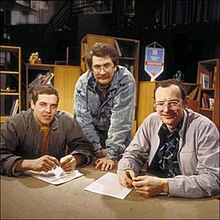Vzglyad (Russian TV program)
| Vzglyad | |
|---|---|
 Original Vzglyad hosts, L-R: Alexander Lyubimov, Vlad Listyev and Dmitry Zakharov | |
| Взгляд | |
| Genre | Infotainment |
| Created by | Anatoly Lysenko Anatoly Malkin Kyra Proshutinskaya Eduard Sagalaev |
| Directed by | Andrey Rasbash Anatoly Malkin Ivan Demidov |
| Opening theme | Brand New by Tatsuhiko Arakawa |
| Country of origin | Soviet Union (1987—1991) Russia (1994—2001) |
| Original language | Russian |
Vzglyad (Russian: Взгляд, lit. 'Outlook') was a popular Russian TV program, officially broadcast from 2 October 1987 to April 2001. It was one of the first programs that changed Russian notions on television.[citation needed] It was also one of the main programs of the television company VID. Vlad Listyev was one of the creators and the first hosts of Vzglyad.[citation needed]
Vzglyad became one of the symbols of perestroika.[1] It shook up the late 80’s Soviet public notion of TV broadcasting and journalism in general. The program showed young hosts wearing informal clothing, live broadcasting and used popular music videos as music breaks. All of that was completely opposite to what an average Soviet viewer had been used to—strictly rehearsed and censured programs. Vzglyad was widely known and discussed by society and media. It was especially popular among urban youth who represented the interests of the new generation, a generation that wanted change.[2][3] Usually, hosts invited guests, such as popular political figures or celebrities, and discussed present-day social issues.
Russian journalist Vladimir Mukusev emphasized that the program’s strong side wasn’t the hosts but the guests.[4] He once said in an interview that Vzglyad is not only a story because it influenced the government’s decision-making process. For example, for the first time the first legal Soviet millionaire Artyom Tarasov was shown to public within the walls of Vzglyad's studio. A discussion of high prices for party membership cards let to a grand scandal which, in its turn, led to enactment which created the legal basis for the country's transition to a multi-structural economy and a real market.[5][6]
References
- ^ "Юбилей программы "Взгляд", изменившей страну: 30 фактов о передаче-легенде". Komsomolskaya Pravda.
- ^ Skillen, Daphne (2016-11-25). Freedom of Speech in Russia: Politics and Media from Gorbachev to Putin. Routledge. ISBN 9781317659884. [page needed]
- ^ История одного Взгляда
- ^ "Владимир Мукусев: "В прямом эфире сегодня редко рождается мысль" | Internews Kazakhstan". www.internews.kz. Archived from the original on 2018-12-14. Retrieved 2017-04-19.
- ^ Mickiewicz, Ellen Propper (1999-01-01). Changing Channels: Television and the Struggle for Power in Russia. Duke University Press. p. 74. ISBN 0822324636.
vlad listyev vzglyad.
[page needed] - ^ «Взгляд»: как клоунада стала оружием в холодной войне
